Raising animals on an off-grid property is a natural progression for many people wanting to live self-sufficiently. Whether you’re looking to produce your own food, maintain your land, or simply enjoy the companionship of animals, they can bring numerous benefits to your off-grid life. From fresh eggs, milk and meat to nutrient-rich manure for your garden, animals contribute to a sustainable and circular approach to living.
Beyond the practical advantages, caring for animals can also create a deeper connection to nature. Observing their habits, learning to meet their needs, and relying on them for essentials like food or land management can transform your relationship with your surroundings. The bond you build with your animals adds a rewarding layer to your daily life. However, keeping animals is not without its challenges. Time, effort, and responsibility are required to ensure their health and well-being. Each animal depends on you for food, water, and shelter, and proper care must take precedence over their potential yields. It’s important to evaluate your resources and remember that raising animals is a long-term commitment, it is not something to take on lightly.
Explore this introductory guide to raising animals off-grid, including the basic care, benefits, and challenges of popular species. Learn more about the responsibilities, legal requirements and ethical practices of taking this next step in off-grid living.
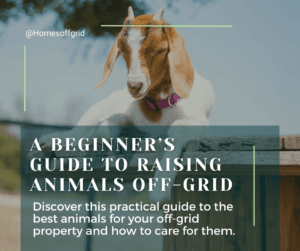
Understanding Regulations and Legal Requirements
Before introducing animals to your off-grid property, it’s essential to understand the legal and regulatory requirements in your area. Laws surrounding animal ownership can vary widely, covering everything from space and shelter requirements to mandatory registrations and local restrictions. Ensuring compliance with these regulations not only helps avoid penalties but also promotes the health and welfare of your animals.
General Guidelines
In many regions, animal welfare laws specify the minimum space each species requires. For instance, cattle need sufficient grazing land, while chickens require enough coop space and access to outdoor areas. Some animals may need secure fencing to prevent escape and to keep predators at bay.
Registration is another common requirement. In the UK, animals such as sheep and cattle must be registered and tagged with identifiers, ensuring traceability. Similar tagging or microchipping regulations exist elsewhere, where animal movements are closely monitored for biosecurity reasons.
Zoning restrictions also play a significant role. In rural areas, owning a wide variety of animals is typically permissible, but urban or suburban settings often have stricter limits on the types and numbers of animals you can keep. Certain urban areas may allow poultry but restrict larger livestock.
Some country-based examples are as follows:
- United Kingdom: In 2024, the UK introduced a law requiring all bird keepers to register their birds, including poultry, to monitor for avian diseases.
- Spain: Anyone looking to keep farm animals in Spain must get a ‘Código de Explotación Ganadera’ (a farm licence) which involves providing the necessary care and welfare for the animals you wish to bring onto your land. The requirements vary across the country.
- United States: Regulations vary by state. Some states require annual permits for keeping specific animals, while others enforce strict zoning laws or mandate veterinary inspections.
Before acquiring any animals, it’s vital to research local regulations thoroughly. Check with your local authority or agricultural department for up-to-date information, as laws can change. In many countries, agricultural extension services or farming organisations offer valuable guidance for specific areas.
By understanding and following these rules, you can create a safe and compliant environment for raising animals on your off-grid property.
Essential Care and Welfare for All Animals
When raising animals on your off-grid property, their welfare must always come first. While animals can provide valuable resources such as food, manure, or labour, they are living beings that depend on you for their well-being. Striking a balance between the practical benefits they offer and the responsibilities of ownership is crucial to creating a humane and ethical off-grid smallholding.
Key things to consider include:
- Adequate Food, Shelter, and Space: Every animal requires sufficient nutrition, safe housing, and enough space to live comfortably. Grazing animals like cattle and sheep need access to quality pasture, while poultry and rabbits thrive with secure enclosures that provide both freedom to move and protection from predators. Ensure each species has an appropriate diet, clean water, and a habitat that supports their natural behaviours.
- Veterinary Care and Costs: Animals occasionally fall ill or require preventative care, such as vaccinations or deworming. Veterinary care can be expensive, so it’s important to factor these costs into your budget. Consider creating an emergency fund for unexpected medical needs. For some species, local regulations might mandate certain health checks or treatments, adding to your responsibilities.
- Ethical Treatment and Avoiding Overbreeding: Off-grid living often involves managing animal populations to prevent overcrowding or resource depletion. Overbreeding can lead to neglect or overexploitation, so it’s important to plan your herd or flock size carefully. For example, only breed animals when you have a clear plan for the offspring, whether that involves selling, raising, or utilising them sustainably on your property.
- Recognising Stress and Behavioural Problems: Animals communicate their needs and discomfort through their behaviour. Learning to recognise signs of stress, illness, or poor welfare – such as changes in eating habits, aggression, or repetitive behaviours – is essential. Identifying and addressing these issues early can prevent more significant problems down the line.
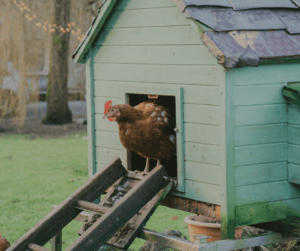
While animals can provide valuable outputs like meat, milk, eggs, or fibre, these benefits come with a commitment to their care. The more you prioritise their welfare, the healthier and more productive your animals will be. Responsible animal care not only ensures they live good lives but also enhances the sustainability and success of your off-grid property.
By focusing on these principles, you can create a compassionate and functional environment where both you and your animals thrive.
Types of Animals to Raise on an Off-Grid Property
Cows
Cows can be a valuable addition to an off-grid property, offering a range of benefits for sustainability and self-sufficiency. However, they require significant resources and attention to ensure their well-being, making them best suited for properties with ample space and a dedicated caretaker.
Care
Cows thrive when they have access to spacious grazing land with nutrient-rich pasture. As ruminants, their diet should primarily consist of grass or hay, supplemented with silage or grain when necessary, particularly during the winter months or in regions where grazing is limited.
Shelter is essential for protecting cows from extreme weather. A simple barn or covered area can suffice, offering shade in the summer and protection from wind, rain, or snow in colder seasons. Additionally, fresh water must always be available, as cows consume large amounts daily.
Milking cows requires a regular schedule, typically twice a day, to maintain their health and milk production. Even if you’re not using their milk, cows must still be milked when lactating to prevent discomfort or infections such as mastitis.
Benefits include:
- Milk Production: A single dairy cow can provide a family with a steady supply of milk for drinking, making cheese, butter, and other dairy products. Excess milk can even be bartered or sold locally.
- Meat: Beef cattle are a reliable source of high-quality meat for those looking to produce their own food.
- Manure: Cow manure is rich in nutrients and can be composted to create an excellent organic fertiliser, enhancing the health of your soil and supporting crop growth.
Suitability
Cows are highly suitable animals for raising off-grid, particularly on larger plots of land where they have lots of room to graze. They contribute to a closed-loop system by recycling nutrients into the soil, and their versatility as a source of both food and fertiliser makes them a popular choice for homesteaders.
However, their care is labour-intensive and requires significant planning, especially during the winter when grazing may not be possible. Before committing to raising cows, ensure your property has sufficient land, is well fenced, and resources to meet their needs year-round. For those who can accommodate them, cows provide a rewarding and sustainable way to support off-grid living.
Sheep and Goats
Sheep and goats are versatile animals that can bring a range of benefits to an off-grid property. Both species are relatively small, adaptable to different environments, and contribute to a sustainable lifestyle in distinct ways. While they share some basic care requirements, they also have unique needs that potential owners should consider.
Care
Both sheep and goats require adequate grazing land or access to forage, although goats are browsers, preferring shrubs, leaves, and weeds, whereas sheep thrive on grass. Both animals benefit from rotational grazing to maintain pasture health and prevent overgrazing.
Secure housing is essential to protect sheep and goats from predators and harsh weather. A simple shelter with dry bedding, such as straw, will help keep them warm and comfortable. Proper fencing is critical, especially for goats, as they are known escape artists and can jump or climb out of enclosures.
Regular health care includes vaccinations, parasite control, and hoof trimming. Shearing is necessary for sheep, usually once or twice a year, depending on the breed.
Benefits include:
- Wool: Sheep provide wool for making clothing, blankets, and other items, which can be particularly valuable in an off-grid setting.
- Milk: Both sheep and goats can be milked, offering alternatives to cow’s milk. Goat milk, in particular, is widely appreciated for its digestibility and is often used to make cheese, yogurt, and soap.
- Meat: Both animals provide a sustainable source of meat for those raising livestock for food.
- Brush Clearing: Goats are natural foragers and can help clear overgrown areas, managing weeds and invasive plants effectively.
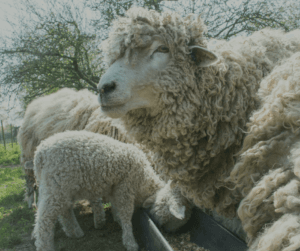
Key differences:
- Grazing Habits: Goats are browsers, preferring a varied diet that includes shrubs and woody plants, while sheep are grazers, primarily eating grass. This makes goats more suited to rugged or overgrown land, whereas sheep excel in maintaining open pasture.
- Behaviour: Goats are curious and social animals, often requiring sturdier fencing and interactive care. Sheep are generally more docile and easier to manage in flocks.
- Housing: Goats are more susceptible to wet and cold conditions than sheep, so their shelters need to be particularly dry and draft-free.
Suitability
Sheep and goats are both excellent choices for off-grid living. Their relatively small size and manageable care needs make them suitable for properties without extensive infrastructure. Goats, with their ability to clear brush and thrive on diverse terrain, are ideal for rougher or wooded areas. Sheep, on the other hand, are well-suited to open fields and are less demanding in terms of housing and fencing.
With their ability to provide food, fibre, and land management, sheep and goats are practical and rewarding additions to any off-grid property. Selecting the right species – or even a combination of both – can enhance your self-sufficiency and contribute to a balanced, sustainable lifestyle.
Pigs
Pigs are highly intelligent, resourceful animals that can offer significant benefits to an off-grid lifestyle. Their ability to convert kitchen scraps and surplus crops into meat, till soil, and reduce waste makes them a valuable addition to many smallholdings. However, raising pigs requires careful planning and commitment to meet their care and welfare needs.
Care
Pigs need a balanced diet to remain healthy and productive. Refrain from overfeeding as obesity can lead to health problems. While they can eat some kitchen scraps, fruits, and vegetables, you should avoid feeding them foods that are toxic to them, such as raw potatoes. They also require a reliable source of protein, often provided through commercial pig feed. It’s important to check local regulations, as feeding pigs certain waste products (e.g., meat or dairy) is illegal in many countries due to biosecurity concerns. Consider sourcing feed locally to reduce costs and environmental impact. Growing crops such as pumpkins, turnips, or forage beets can supplement their diet while cutting down on expenses. Access to clean water is vital, as pigs are prone to dehydration, especially in warmer climates.
Housing for pigs should include a sturdy, weatherproof shelter with dry bedding, such as straw. Pigs are strong and can easily damage flimsy structures, so secure housing is a must. They also need outdoor space for exercise, rooting, and wallowing. Wallows (mud pits) help pigs cool down and protect their skin from sunburn and parasites.
Pigs are social animals that thrive in groups. Keeping at least two pigs together prevents loneliness and promotes natural behaviours. They also benefit from enrichment activities, such as foraging or interacting with objects, to keep their active minds engaged.
Benefits include:
- Meat: Pigs are one of the most efficient sources of high-quality meat, making them a staple on many off-grid properties. Their relatively fast growth rate means they can reach market weight in as little as six months.
- Soil Tilling: Pigs are natural diggers and can be used to clear land, till soil, or prepare garden beds. This saves labour and provides a sustainable way to improve soil health.
- Waste Consumption: Pigs can convert food waste and surplus crops into valuable protein, reducing waste on your property and contributing to a circular approach to living off-grid.
Suitability
Pigs can play a significant role in sustainable living when managed responsibly. Rotational grazing or movable pens can prevent overuse of land and ensure they always have fresh ground to explore. This method also spreads their manure evenly, enriching the soil naturally.
Pigs are a practical choice for off-grid homesteads that can provide the necessary space, shelter, and feed. Their ability to recycle waste and improve soil fertility makes them particularly suited to sustainable smallholdings. While they require robust fencing and active management, the rewards they offer in terms of food production and land management make them an excellent investment for those interested in raising animals off-grid.
With proper care and thoughtful planning, this animal can thrive as an integral part of your off-grid lifestyle.
Birds (Poultry)
Poultry are versatile and valuable additions to an off-grid property, offering a variety of benefits including eggs, meat, pest control, and fertilisation. All poultry require secure housing to protect them from weather and predators. Coops or shelters should include adequate ventilation, dry bedding, and nesting or resting areas. Clean water is a non-negotiable requirement for all birds. Predator protection is crucial. Secure fencing, sturdy housing, and vigilance are essential to safeguard poultry from threats such as foxes, or birds of prey. Whether you choose chickens, ducks, geese, turkeys, quail, or guinea fowl, these birds can become a cornerstone of your off-grid homestead.
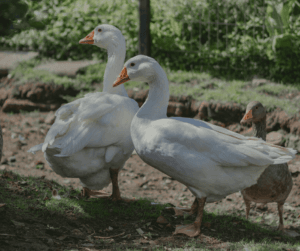
Chickens:
These birds are among the most popular and adaptable poultry, providing a steady supply of fresh, protein-rich eggs and meat. They are often the first choice for people looking to start raising animals on their off-grid property. They are also excellent for pest control, helping maintain garden health by eating insects and slugs while foraging. Chickens require a secure coop with nesting boxes for egg-laying and roosting bars for sleeping. They also benefit from a run or free-range setup where they can forage. Their diet should include pellets, grains, and scraps (avoid harmful foods like raw potatoes and chocolate). Chickens are well-suited to most off-grid properties, especially those with limited space. They are low-maintenance and provide reliable returns.
Ducks and Geese:
If you want to add diversity to your off-grid homestead, these species offer unique benefits beyond what chickens provide. Like chickens, ducks excel at pest control, consuming slugs, and other garden pests but they also lay larger, richer eggs than chickens. Geese, while less prolific egg layers, are excellent for meat production and help maintain grassland. Both ducks and geese contribute to pond maintenance and provide nutrient-rich manure. Ducks and geese need access to water for drinking and swimming. Geese require more grazing space and can subsist mainly on grass, while ducks thrive on grains, vegetables, and forage. Ducks are ideal for properties with water features or smaller grazing areas, while geese thrive in larger spaces with plenty of grass. Geese can also serve as guard animals, alerting to intruders.
Other Poultry:
For those looking to diversify their meat production, turkeys, quail, and guinea fowl can be valuable additions to your flock. Turkeys provide substantial meat yield with fewer birds, making them an efficient meat source. They are hardy and adaptable to various climates but need spacious housing and outdoor areas to roam. They require a high-protein diet, typically through turkey-specific feed or supplemented with grains and forage. Quail are excellent for smaller homesteads due to their minimal space requirements and high egg production. These birds thrive in cages or small aviaries and are low-maintenance, needing only minimal space and food. Guinea fowl are known for their tick control and are relatively low-maintenance, providing both meat and eggs. They benefit from a secure run and require less space than larger poultry. These birds provide diverse meat options, making them worthwhile additions if you have the capacity to manage them.
Rabbits
Rabbits are a versatile and low-maintenance option for small-scale off-grid setups, offering benefits ranging from meat production to companionship. Their modest care requirements make them a practical choice for homesteaders with limited space or resources.
Care
Rabbits need secure hutches or enclosures to protect them from predators and extreme weather. Their housing should include a sheltered sleeping area, space to move freely, and materials for burrowing or chewing to satisfy their natural behaviours. Rabbits require a diet rich in fibre, primarily hay or grass, supplemented with fresh vegetables, leafy greens, and small amounts of rabbit-specific pellets. Clean, fresh water must always be available. Rabbits reproduce quickly, so careful planning is necessary to avoid overpopulation. Limit breeding to what your setup can sustainably manage, ensuring each litter has sufficient resources and space.
Benefits include:
- Meat Production: Rabbits are a sustainable source of lean, high-protein meat, particularly suitable for off-grid families seeking self-sufficiency. Their efficient feed-to-meat conversion ratio makes them an economical choice for small-scale farming.
- Companionship: For those not raising rabbits for meat, they can provide companionship and serve as gentle, low-maintenance livestock.
- Fertiliser: Rabbit droppings are extremely nutritious and are a great form of fertiliser for the garden. Use it on your own soil or consider swapping or selling any excess.
- Low Maintenance: Compared to larger livestock, rabbits are less demanding in terms of space, feed, and overall care requirements.
Suitability
Rabbits are exceptionally well-suited animals to begin raising off-grid. They require little space, minimal feed compared to larger animals and provide a sustainable protein source. Their low-maintenance care and adaptability to various climates further enhance their appeal for off-grid homesteaders looking for practical and manageable livestock options.
In some regions, people also raise guinea pigs for meat. While they offer similar benefits, guinea pigs have distinct dietary and housing needs and should not be housed with rabbits due to potential health risks and behavioural differences.
Beekeeping
Beekeeping is a rewarding addition to any off-grid property, offering both practical benefits and a stronger connection to the natural world. While bees require specific care and attention, their contributions to your homestead – such as honey, beeswax, and pollination – make them invaluable for self-sufficiency.
The basics
Setting up a hive requires careful selection of location. Choose a spot that is sheltered from strong winds, gets ample sunlight, and is away from high-traffic areas. There are a variety of hive styles, each catering to different preferences and levels of experience. In spring and summer, bees are most active, requiring adequate space in the hive for honey production and brood rearing. In autumn, prepare the hive for winter by ensuring the colony has enough honey stores and insulation to survive colder months. Bees are generally self-sufficient, but regular checks are essential to monitor hive health, prevent disease, and manage pests like mites. Inspect the hive every few weeks during active seasons, ensuring the queen is laying eggs and the colony has enough resources.
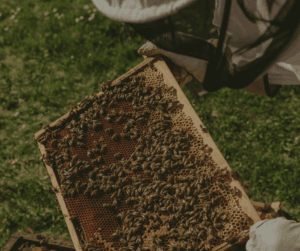
Benefits include:
- Honey: A renewable and versatile resource, honey provides a natural sweetener and can be used for medicinal and preservative purposes.
- Wax: Beeswax is valuable for making candles, cosmetics, and polishes, offering opportunities for homemade or marketable goods.
- Pollination: Bees improve the productivity of your garden or orchard by pollinating flowers, boosting yields for fruit, vegetables, and other crops.
Suitability
Beekeeping aligns perfectly with off-grid living. It requires minimal space and resources, and bees naturally forage within a two-to-three-mile radius, making them independent foragers. The honey, wax, and pollination services they provide integrate seamlessly into a self-sufficient, sustainable lifestyle. With proper care and a commitment to learning, bees can become a productive and fascinating part of your off-grid homestead.
Other Animals
Raising less common animals such as alpacas, llamas, and donkeys to your off-grid homestead can provide unique benefits that enhance your self-sufficient lifestyle. While these animals have specific care requirements, their contributions to tasks like wool production, pest control, and land management make them valuable additions to the right setup.
Examples and Unique Benefits
- Alpacas and Llamas: These animals are primarily known for their fibre production. Alpacas produce soft, hypoallergenic fleece ideal for spinning into yarn or making textiles, while llamas have coarser wool suited to rugs and outerwear. Both are also excellent pack animals, useful for transporting goods across your property or on excursions. Llamas, in particular, can be protective herd animals, warding off predators.
- Horses: Horses offer a versatile range of benefits for off-grid living. As pack animals, they can carry goods or assist in draught work like ploughing fields. Horses can also serve as transportation, especially in areas with limited road access. Beyond their practical uses, they bring companionship, can help manage pastureland through controlled grazing and their manure can provide nutrients for your plants.
- Donkeys: Donkeys are hardy animals that excel as pack animals and can be used for light draught work. They can also provide companionship to other animals, particularly horses, and help control weeds and unwanted vegetation through grazing.
Special Care Considerations
These species all require a balanced diet of hay, pasture, and occasional supplements. Alpacas and llamas are light grazers and thrive on low-protein forage, while horses and donkeys need fibre-rich feed like hay to prevent overeating and obesity. These animals need simple but sturdy shelters to protect them from extreme weather. Alpacas and llamas are more cold-tolerant but benefit from windbreaks and shaded areas, while horses and donkeys need dry shelters, especially during wet conditions, to avoid hoof problems. Alpacas and llamas are herd animals that should not be kept alone; they thrive in groups of their own kind. Donkeys and horses are also social and prefer companionship, whether from the same species or other livestock.
Suitability for Off-Grid Living
These animals integrate well into off-grid living for those with adequate space and resources. Their low-maintenance nature (compared to larger livestock) and multiple uses – whether for wool, draught work, transport, or predator deterrence – make them versatile options. However, their needs for companionship, regular grooming, and veterinary care must be carefully managed.
By raising any of these animals on your off-grid property, you can diversify your homestead’s outputs and create a more resilient and productive system.
Conclusion
Living off-grid and raising animals on your property can be a fulfilling and sustainable way to live. The connection to nature and the self-sufficiency it brings cannot be overstated – producing your own food, compost, and manure while knowing your animals are well cared for is both rewarding and necessary. However, this transition requires thorough research and a deep commitment to ethical care. Understanding local regulations, providing adequate shelter, food, and veterinary care, and ensuring your animals are treated humanely are critical. As you consider raising animals on your off-grid property, remember to assess your resources, property size, and personal capabilities. With the right approach, you can build a sustainable, self-sufficient lifestyle that respects both the environment and the animals that share your space.
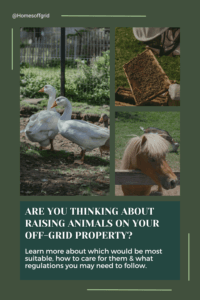
To find out more about off-grid living return to our Reading Room.


